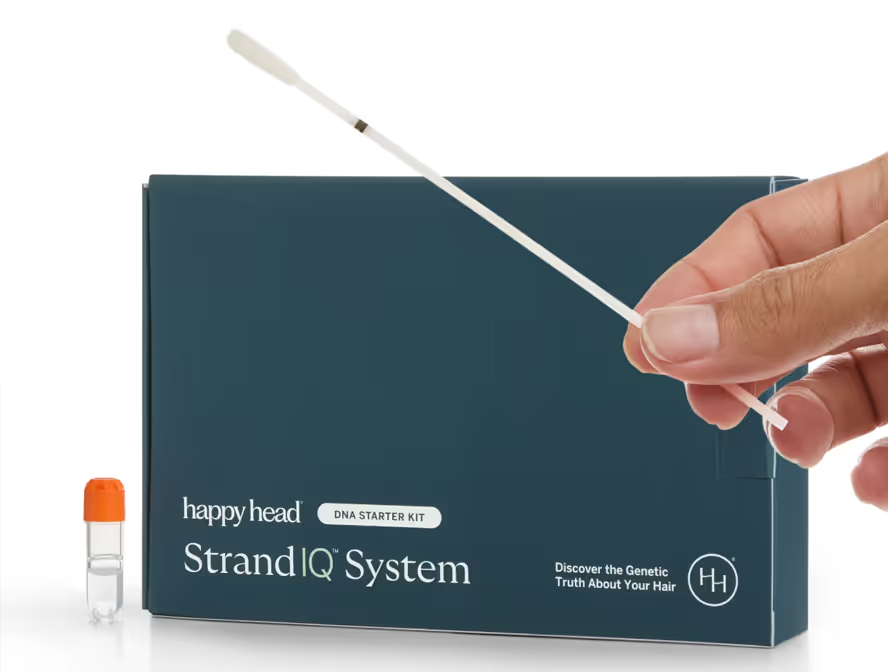Collagen isn’t just a buzzword in skincare—it’s foundational to the health of your scalp and hair. As the body’s most abundant protein, collagen plays a key role in strengthening the connective tissues that support hair follicles. It helps promote hair growth, improves fiber diameter, and neutralizes oxidative stress.
But as we age, or with prolonged exposure to UV rays and environmental irritants like chlorine and pollution, collagen breaks down. This process is often accelerated in individuals with genetic variants that increase matrix metalloproteinase (MMP) enzyme activity—proteins that degrade collagen. When scalp collagen deteriorates, the skin becomes thinner and less elastic, weakening follicles and leading to hair that’s brittle, fine, and prone to shedding.
The Science Behind Collagen Breakdown in the Scalp
Collagen supports the dermal structure of the scalp, where it plays a vital role in maintaining hair follicle integrity. It provides cushioning and elasticity and even impacts the diameter of individual hair strands—meaning a fuller, healthier-looking head of hair.
Unfortunately, collagen production naturally declines with age. UV damage and exposure to toxins like cigarette smoke and chlorinated water speed up the release of MMP enzymes, which actively degrade collagen fibers. Genetics can further increase susceptibility: certain variants upregulate MMP activity, leaving the scalp more vulnerable to structural decline and follicle weakening.
How Genetics Influence Collagen Loss
If you have specific genetic variants that increase the activity of MMP enzymes, your body may break down collagen more rapidly than the average person. These enzymes are part of the body’s natural remodeling processes, but when overactive, they impair skin and follicle health, leading to thinner, more fragile hair. Understanding your genetic profile helps you take early, targeted action to preserve collagen and slow visible signs of scalp aging.
Your Personalized Scalp Collagen Game Plan
Creating a personalized scalp care plan should reflect your individual risk level, a factor that takes into account both your lifestyle and genetic background. Below are recommendations sorted by risk level to help protect your scalp from collagen breakdown:
Low Risk: Basic Maintenance for Collagen Preservation
If your Happy Head StrandIQ™ analysis identified you as being at a low risk for collagen breakdown, you can maintain scalp collagen with simple, supportive habits:
- Collagen-rich foods
Simply adding foods like bone broth, fish, eggs, and garlic to your diet is a great way to naturally support collagen levels. - Environmental awareness
To help stave off collagen breakdown, avoid collagen-depleting factors like smoking and swimming in chlorinated pools. - Antioxidant-rich products
Use haircare products containing polyphenols, flavonoids, or carotenoids to help protect against oxidative stress.
Medium Risk: Strategic Prevention and Stimulation
If you’ve been identified as being at a moderate genetic risk for collagen breakdown, lifestyle and product tweaks become more important:
- Targeted product use
Incorporate shampoos or serums rich in polyphenols, flavonoids, and carotenoids into your routine. - Supplement consideration
Consult your provider about hyaluronic acid or collagen supplements to stimulate production. - Reduce exposure
Limit time in chlorinated pools and avoid smoking or secondhand smoke.
High Risk: Intensive Scalp Collagen Support
If your StrandIQ™ analysis has determined you are genetically predisposed to higher collagen breakdown, it’s time for proactive, intensive care:
- Collagen-rich diet and drinkables
Focus on a diet rich in collagen-boosting foods like fish, bone broth, eggs, and garlic, and consider drinkable collagen formulas. - Advanced topical care
Use haircare products rich in antioxidants and scalp-nourishing compounds like flavonoids and carotenoids. - Incorporate hyaluronic acid
Add hyaluronic acid to your skincare or haircare routine—it helps retain moisture and supports collagen synthesis. - Avoid environmental triggers
Reduce exposure to chlorine, pollution, and cigarette smoke as much as possible. - Medical guidance
Work with your Happy Head dermatologist to explore high-strength supplements or treatments targeting collagen support.
Collagen Breakdown: A Manageable Risk
While genetics and aging may predispose you to faster collagen loss, the right combination of diet, topicals, and environmental control can significantly slow the process. By understanding your genetic risk and taking proactive steps—like the personalized solutions offered at Happy Head—you can preserve your scalp’s integrity and promote long-term hair resilience.
Resources
StrandIQ SNP Marker Count: 4
StrandIQ Genes for Trait:
MMP1, MMP9, SLC12A5-AS1, WTAPP1
References:
Geusens, B., & Haykal, D. (2025). Genetic profiling and precision skin care: a review. Frontiers in Genetics, 16, 1559510. PMID: 40529811.
Haykal, D. (2025). Leveraging single nucleotide polymorphism profiling for precision skin care: How SNPs shape individual responses in cosmetic dermatology. Journal of Cosmetic Dermatology, 24(1), e16750. PMID: 39737554.
Naval, J., et al. (2014). Genetic polymorphisms and skin aging: the identification of population genotypic groups holds potential for personalized treatments. Clinical, Cosmetic and Investigational Dermatology, 7, 207–214. PMID: 25061327.
Sepetiene, R., et al. (2023). Genetical signature—An example of a personalized skin aging investigation with possible implementation in clinical practice. Journal of Personalized Medicine, 13(9), 1305. PMID: 37763073.
This content, including StrandIQ™ DNA analysis reports and any Happy Head products and/or services referenced therein, is for informational and cosmetic purposes only. It is not intended to diagnose, treat, cure, or prevent any disease. This content does not constitute medical advice and should not be used to make healthcare decisions. References to prescription treatments are educational in nature. Always consult a licensed healthcare professional for any medical concerns or treatment decisions.





.avif)






